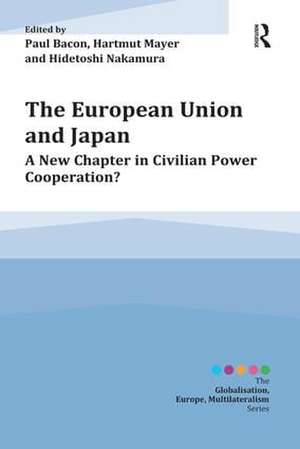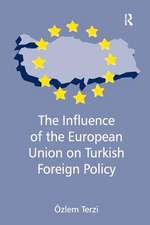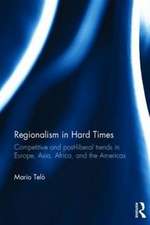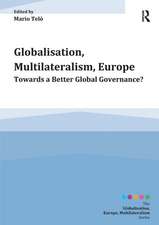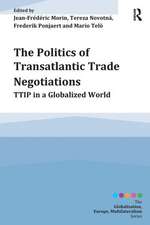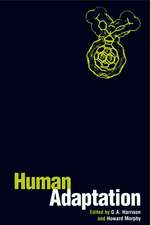The European Union and Japan: A New Chapter in Civilian Power Cooperation?: Globalisation, Europe, and Multilateralism
Editat de Paul Bacon, Hartmut Mayer, Hidetoshi Nakamuraen Limba Engleză Paperback – 28 mar 2015
| Toate formatele și edițiile | Preț | Express |
|---|---|---|
| Paperback (1) | 431.25 lei 6-8 săpt. | |
| Taylor & Francis – 28 mar 2015 | 431.25 lei 6-8 săpt. | |
| Hardback (1) | 769.00 lei 6-8 săpt. | |
| Taylor & Francis – 28 mar 2015 | 769.00 lei 6-8 săpt. |
Din seria Globalisation, Europe, and Multilateralism
-
 Preț: 310.95 lei
Preț: 310.95 lei -
 Preț: 283.24 lei
Preț: 283.24 lei -
 Preț: 302.05 lei
Preț: 302.05 lei - 9%
 Preț: 934.94 lei
Preț: 934.94 lei -
 Preț: 188.56 lei
Preț: 188.56 lei -
 Preț: 305.70 lei
Preț: 305.70 lei -
 Preț: 108.84 lei
Preț: 108.84 lei -
 Preț: 287.67 lei
Preț: 287.67 lei -
 Preț: 356.44 lei
Preț: 356.44 lei -
 Preț: 366.85 lei
Preț: 366.85 lei -
 Preț: 349.91 lei
Preț: 349.91 lei - 16%
 Preț: 248.23 lei
Preț: 248.23 lei -
 Preț: 385.74 lei
Preț: 385.74 lei -
 Preț: 347.41 lei
Preț: 347.41 lei -
 Preț: 383.45 lei
Preț: 383.45 lei -
 Preț: 363.58 lei
Preț: 363.58 lei - 18%
 Preț: 891.07 lei
Preț: 891.07 lei -
 Preț: 386.55 lei
Preț: 386.55 lei - 17%
 Preț: 258.50 lei
Preț: 258.50 lei - 18%
 Preț: 900.53 lei
Preț: 900.53 lei -
 Preț: 369.73 lei
Preț: 369.73 lei - 18%
 Preț: 837.25 lei
Preț: 837.25 lei -
 Preț: 385.74 lei
Preț: 385.74 lei -
 Preț: 367.45 lei
Preț: 367.45 lei -
 Preț: 434.45 lei
Preț: 434.45 lei - 22%
 Preț: 333.01 lei
Preț: 333.01 lei -
 Preț: 374.94 lei
Preț: 374.94 lei - 18%
 Preț: 999.98 lei
Preț: 999.98 lei - 25%
 Preț: 769.00 lei
Preț: 769.00 lei - 25%
 Preț: 664.66 lei
Preț: 664.66 lei
Preț: 431.25 lei
Preț vechi: 507.35 lei
-15% Nou
Puncte Express: 647
Preț estimativ în valută:
82.52€ • 86.16$ • 68.30£
82.52€ • 86.16$ • 68.30£
Carte tipărită la comandă
Livrare economică 04-18 aprilie
Preluare comenzi: 021 569.72.76
Specificații
ISBN-13: 9781472457493
ISBN-10: 1472457498
Pagini: 304
Ilustrații: Includes 13 b&w illustrations
Dimensiuni: 156 x 234 x 22 mm
Greutate: 0.57 kg
Ediția:New ed.
Editura: Taylor & Francis
Colecția Routledge
Seria Globalisation, Europe, and Multilateralism
Locul publicării:Oxford, United Kingdom
ISBN-10: 1472457498
Pagini: 304
Ilustrații: Includes 13 b&w illustrations
Dimensiuni: 156 x 234 x 22 mm
Greutate: 0.57 kg
Ediția:New ed.
Editura: Taylor & Francis
Colecția Routledge
Seria Globalisation, Europe, and Multilateralism
Locul publicării:Oxford, United Kingdom
Recenzii
"When war-related deaths in the world have been dramatically reduced, the world desperately needs those actors and institutions who tackle, head-on and with professional expertise, mundane daily life issues such as trade and regulations, environmental, economic and energy security issues and political, food and health security issues. The EU and Japan are among two of them. This volume is a must-read to know what civilian powers aspire and carry out."
Takashi Inoguchi, University of Tokyo and University of Niigata Prefecture, Japan
"The European Union and Japan takes a long overdue and fresh look at this interregional relationship of potential considerable importance to international stability and governance. The book gathers together some of the leading scholars, both established and emerging, working in this area today in Japan, Europe and North America. This book demonstrates the continuing problems in maximising EU-Japan relations, but also demonstrates key areas of cooperation across economics, security, and a broad range of new and pressing global governance issues. It is essential reading for students, scholars and practitioners alike."
Christopher W. Hughes, University of Warwick, UK
"This excellent book could not come at a better moment. Japan and the EU are negotiating a bilateral economic partnership agreement which is much more discrete than its rivals, between Japan and the US and between the EU and the US. This book gives a precious analysis of the relatively little known existing relations between Japan and the EU in domains at the core of the negotiations."
Patrick Messerlin, Sciences Po, France
Takashi Inoguchi, University of Tokyo and University of Niigata Prefecture, Japan
"The European Union and Japan takes a long overdue and fresh look at this interregional relationship of potential considerable importance to international stability and governance. The book gathers together some of the leading scholars, both established and emerging, working in this area today in Japan, Europe and North America. This book demonstrates the continuing problems in maximising EU-Japan relations, but also demonstrates key areas of cooperation across economics, security, and a broad range of new and pressing global governance issues. It is essential reading for students, scholars and practitioners alike."
Christopher W. Hughes, University of Warwick, UK
"This excellent book could not come at a better moment. Japan and the EU are negotiating a bilateral economic partnership agreement which is much more discrete than its rivals, between Japan and the US and between the EU and the US. This book gives a precious analysis of the relatively little known existing relations between Japan and the EU in domains at the core of the negotiations."
Patrick Messerlin, Sciences Po, France
Notă biografică
Paul Bacon is Deputy Director of the European Union Institute in Japan at Waseda University, and an Associate Professor of International Relations at Waseda’s School of International Liberal Studies.
Hartmut Mayer has been Official Fellow and Tutor in Politics (International Relations) at St. Peter’s College, University of Oxford, and a member of Oxford University’s Department of Politics and International Relations since 1998.
Hidetoshi Nakamura is currently Associate Professor of International Relations, Faculty of Political Science and Economics, Waseda University, and also Deputy Director, European Union Institute in Japan at Waseda University.
Hartmut Mayer has been Official Fellow and Tutor in Politics (International Relations) at St. Peter’s College, University of Oxford, and a member of Oxford University’s Department of Politics and International Relations since 1998.
Hidetoshi Nakamura is currently Associate Professor of International Relations, Faculty of Political Science and Economics, Waseda University, and also Deputy Director, European Union Institute in Japan at Waseda University.
Cuprins
Introduction; I: Japan, the EU and Civilian Power Relations; 1: Japan as a ‘Proactive Civilian Power'? Domestic Constraints and Competing Priorities; 2: The EU in a Changing Global Order; 3: The EU through the Eyes of Japan; II: Enhancing Trade Relations and Regulatory Standards; 4: Three Balancing Acts; 5: The Political and Institutional Significance of an EU–Japan Trade and Partnership Agreement; 6: Food Fights or a Recipe for Cooperation? EU–Japan Relations and the Development of Norms in Food Safety Policy 1; III: Promoting Environmental, Economic and Energy Security; 7: Environmental and Energy Policy; 8: Sympathy or Self-Interest? The Development Agendas of the European Union and Japan in the 2000s; 9: Saving the Kyoto Protocol; IV: Protecting Political, Food and Health Security; 10: EU–Japan Relations; 11: The EU, Japan and the Balkans; 12: Global Governance of Dual Use in Biomedical Research; 13: Accountability and the Governance of Food Safety Policy in the EU and Japan
Descriere
The EU and Japan have one of the most important trade relationships in the world. Fittingly, this book presents a detailed analysis of their bilateral regulatory environment and negotiation processes. Moreover, the two polities have also co-operated extensively in bilateral and multilateral contexts on a range of global governance issues. Nevertheless, the relationship is widely acknowledged to have significant untapped potential. Deploying the concept of civilian power, the book takes a fresh, honest and provocative look at this important relationship, in a post-Fukushima, post-sovereign debt crisis world.
